
PECERA Annual Conference 2024 Tokyo
from August 2 to August 4, 2024
TOYO UNIVERSITY Akabanedai-Campus
If you can access google-base websites, Go to:
Updated on August 12
Please check Keynotes
LINK to Program ABSTRACTS
Updated on August 12

Post Coference Notices
Notices
- We genuinely appreciate your active participation and contributions to the PECERA conference.
- Your certificate of participation will be available between August 22 and September 30.
- If you need something fixed in conference proceedings, please request it by August 15 (Japan Time). After this date, we will not be able to accommodate your requests for corrections for any reason.
Email Address
pecera2024Tokyo@outlook.jp
pecera2024tokyo@gmail.com
February 1, 2024
Call for the proposal, general organization of sessions and guidelines of presentations, and Accommodation information.
March 1, 2024 Starting submission
April 3015, 2024 Submission CLOSED
May 10~May 31, 2024 Letter of Acceptance
June 1~ School Visit Registration
June 10 Closed (reached the maximum number)
June 15, 2024: Early bird registration ends
June 30, 2024: Normal Registration ends
July 14, 2024
Programs, publication of proceedings (PDF) will be open
August 2-4, 2024 Conference
Important Dates

THEME
Children’s well-being founded on reciprocal relationship
The child's well-being is based on reciprocal relationships among children, teachers, parents, ECEC centers and schools, and community members. There are multiple aspects of reciprocal relationships. Children from diverse backgrounds and different age groups can have reciprocal relationships between them. Reciprocal relationships between ECEC teachers and primary school teachers will create new possibilities in their collaboration. Children are citizens of our community, and able to have reciprocal relationships with community members around the ECEC center.
The PECERA conference will provide space for local, national, and international conversations on children's well-being.
Only if you are from countries having trouble accessing Google websites, follow the instructions from the link.
Proposal Submission
When submitting your proposals, you will be asked to enter the following information:
The type of the presentation
The title of the presentation
The name, institution, and email address of the main author, and name(s) and e-mail address(es9 of the co-author(s)
A 250-500 word abstract addressing the elements below. Please download the template.
Structure of the Research Proposal
a. Title
b. Necessity of the study
c. Purpose(s) and research question(s) of the study
d. Research method including participants, tools or measures, and data analysis
e. Summary of main findings, conclusions, and implication(s)
(For ongoing research studies, expected outcomes and anticipated contribution of the research would suffice)
f. five keywords
Registration fees
Early Bird
(Member): Regular Participant
Registration Fee USD 350
(Member): Student
Registration Fee USD 220
(Non-Member): Regular Participant
Registration fee USD 430
(Non-Member):
Student Registration Fee USD 300
Normal
(Member): Regular Participant
Registration Fee USD 450
(Member): Student
Registration Fee USD 290
(Non-Member):
Regular Participant
Registration Fee USD 525
(Non-Member):
Student Registration Fee USD 375
Join PECERA today to register with a member fee
Go to: https://www.pecera.org/member/login
The Venue & Travel Infomation
Akabane Station (JR Line)
- West Exit: 8-minute walk to campus
Akabane-Iwabuchi Station (Tokyo Metro Namboku Line / Saitama Rapid Transit Line)
- Exit 2: 12 minutes walk to the campus
Keynotes & Symposists
CHUNG Kevin Kien Hoa 鍾杰華 is a Chair Professor of Child Development and Special Education and Director of the Centre for Child and Family Science at the Education University of Hong Kong

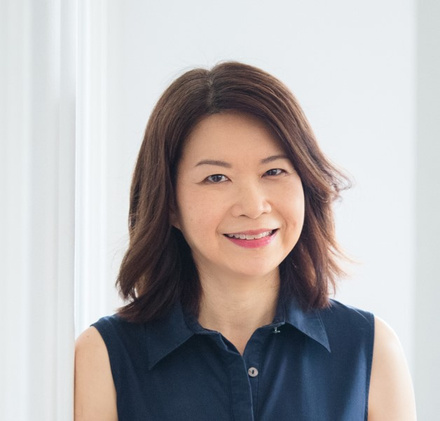
Dr. Sirene Lim
Dr Sirene Lim is an Associate Professor at the Singapore University of Social Sciences, and currently holds the position of Vice Dean of the S R Nathan School of Human Development. Her research interests include early childhood policies, childhood studies, and teacher education.
Dr. Norika Horikoshi
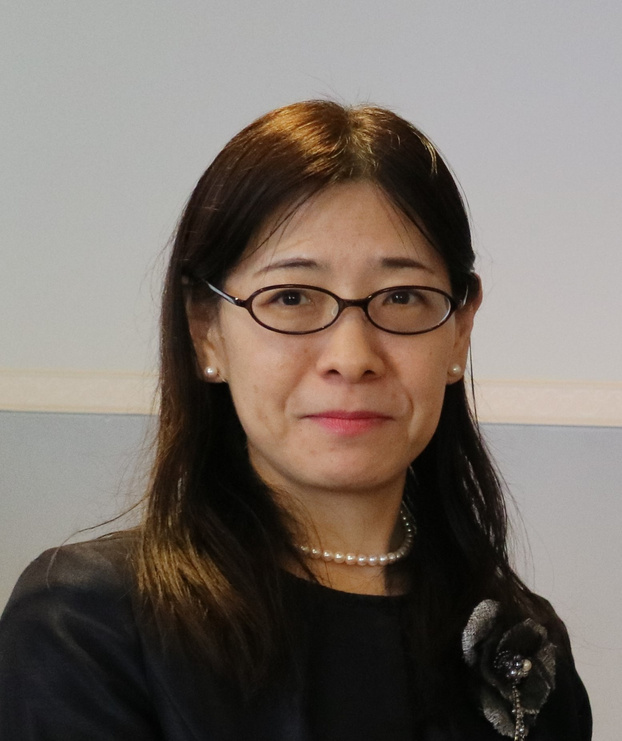
Deputy Director・Senior Researcher of the Early Childhood Education Research Center (ECERC). The ECERC was established in 2016 under the National Institute for Educational Policy Research (NIER) as the first national research institute for early childhood education in Japan.
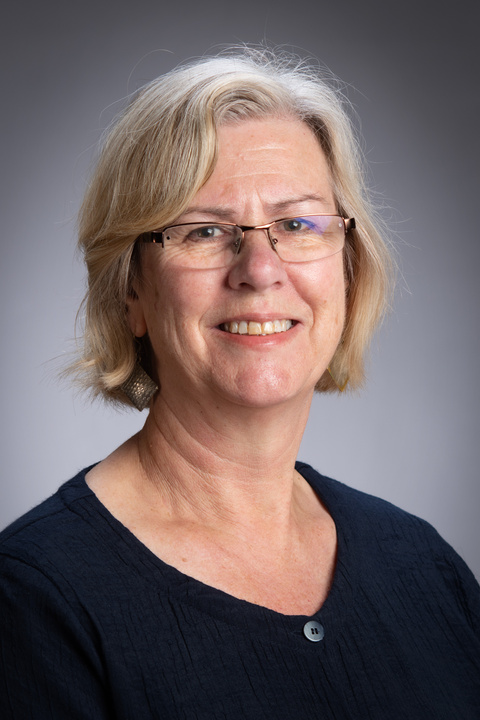
Keynotes & Symposists
Dr. Sue Cherringoton
Associate Professor Sue Cherrington is the Head of School of the School of Education at Te Herenga Waka Victoria University of Wellington, New Zealand. Sue has an extensive background in early childhood education, as both a kindergarten teacher and, since 1992, in early childhood teacher education. Prior to her current role, over the last twenty years. Sue has held roles as Director of the Institute for Early Childhood Studies, Associate Dean (Academic), Associate Dean (Early Childhood Education), and Director and Head of School for Early Childhood Teacher Education.
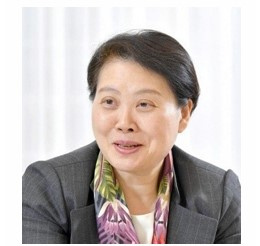
Dr. Michiko Otani
Dr. Mikiko Otani is a member (2017-2025) and former Chair of the United Nations Committee on the Rights of the Child (2021-2023). She is an international human rights lawyer based in Tokyo where practicing family law with focus on women’s and children’s rights. The areas of her focus include human rights education, child participation, girl child, human trafficking, children and armed conflict, and access to justice. She is currently a Commissioner and a Member of the Executive Committee of the International Commission of Jurists and a Vice President of the Asian Society of International Law.
Dr. Otani is active in academic, research and teaching works. She has been a lecturer on international human rights at Soka University Graduate School of Law. She was invited to give lectures at the training seminars for lawyers, judges and other professionals of many countries including Cambodia, Mongolia, Iraq, Iran, Malaysia, Sri Lanka, Czech Republic, Slovakia, Fiji and Philippines, on the international human rights law, women’s rights and children’s rights. She taught women’s and children’s issues in Japan and East Asia as a visiting professor at the William S. Richardson School of Law, University of Hawai`i at Manoa in 2011. Dr. Otani was appointed as the Rotating Honorary Chair in Enforcement of Children’s Rights 2023/2024 at the Department of Child Law of Leiden University. She is also a member of the Scientific Committee of the Universities Network for Children in Armed Conflict.

Keynotes & Symposists
Dr. Cristina Gillandersi
Cristina Gillanders, PhD is an Associate Professor in Early Childhood Education at the School of Education and Human Development at the University of Colorado Denver. Born in Venezuela, raised in Argentina and an immigrant to the United States, her research focuses on the development and learning of young bilingual children, preparing teachers to work with young bilingual children, minoritized parents’ beliefs and practices, and home-school partnerships. She has worked as an early childhood education director in Venezuela and a bilingual preschool teacher in the United States. She served as a Co-PI in the Nuestros Niños School Readiness Professional Development Program, an experimental study that examined the efficacy of a professional development program aimed at promoting language, literacy, and social-emotional development, and mathematics learning in prekindergarten Spanish-English young bilingual children. She currently leads a project supported by an award from the Office of English Language Acquisition (US Department of Education) to implement a teaching certificate program for preschool teachers to work with young bilingual children. She also obtained a Fulbright Award in which she led a study in Chile on the development of alphabet knowledge in young Spanish-speaking children and a systematic literature review of Spanish early literacy development. She served on the Board of Directors in the National Association for the Education of Young Children (NAEYC) and received a service award from the NAEYC Latino Special Interest Group.

Preparing your presentation
Paper Presentation Guidelines
Poster Presentation Guidelines
- There are a number of concurrent sessions in different rooms during each paper presentation period. Presenters will be notified of the presentation session and venue by email.
- A chair will be present in each session to briefly introduce the presenters, manage time, open up for discussion, draw conclusions, provide feedback, etc.
- In the case of a face-to-face conference, each room is equipped with a computer and projector.
- Each presenter is given 15 min to present and another 5 for Q&A.
- The presentation should not be read verbatim from the paper. Not only are such presentations usually dull, but because of time constraints, the author may be cut off by the session chair before reaching the most significant aspects of the presentation.
- The presenter should prepare an outline of the major points of the paper. Presentations should, on average, represent a 12–15–minute summary of the paper. Highlights may be given covering such points as the purpose of the study, methodology, problems, findings, conclusions, and implications. The amount of time devoted to each highlight will vary according to the author’s evaluation of the importance of each area to the paper.
- The Akabanedai Campus has all forms of basic ICT infrastructure, including wireless LAN accessible throughout the campus, and supports teamwork in such areas as cloud-based lecture attendance, acquirement of materials, and file sharing. Edurome account can access the Toyo Wi-Fi system.
- Presenters will be assigned a poster board for the display. One poster session is for one hour, and the presenter(s) should be there to present.
- The poster needs to be ready by the time assigned. (The time will be shown soon here.) After the presentation, the author(s) are responsible to take it with them.
- The poster board size is 1 meter by 2 meters high, You can arrange your poster presentation within this size. You do not have to create the exact size of the poster
- The presenter should be ready 15 minutes prior to the poster sessions.
- - Presenters may display the materials in their own way as long as they are within the board.
- -Please bring pins for your poster. The poster boards are made of paperboards
- - Display materials should be taken down after the end of your session. Display materials that are not removed following the conclusion of the session will be discarded.
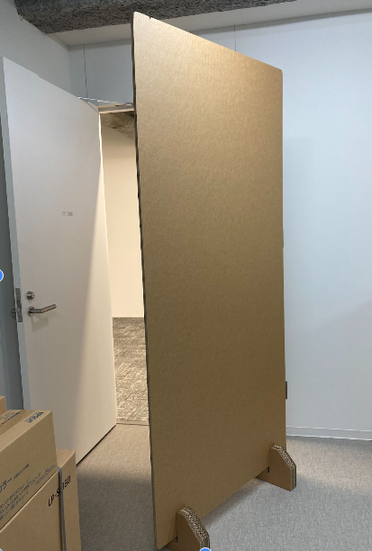


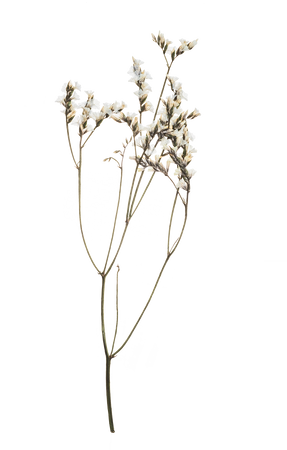

Schedule
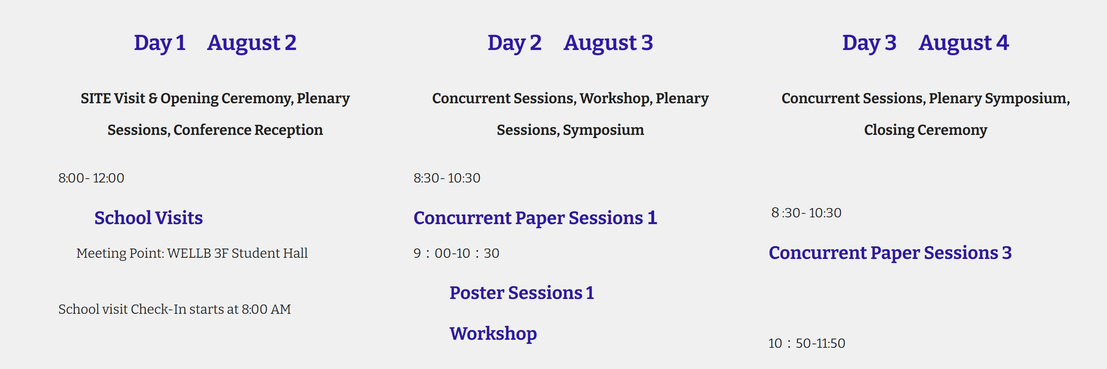
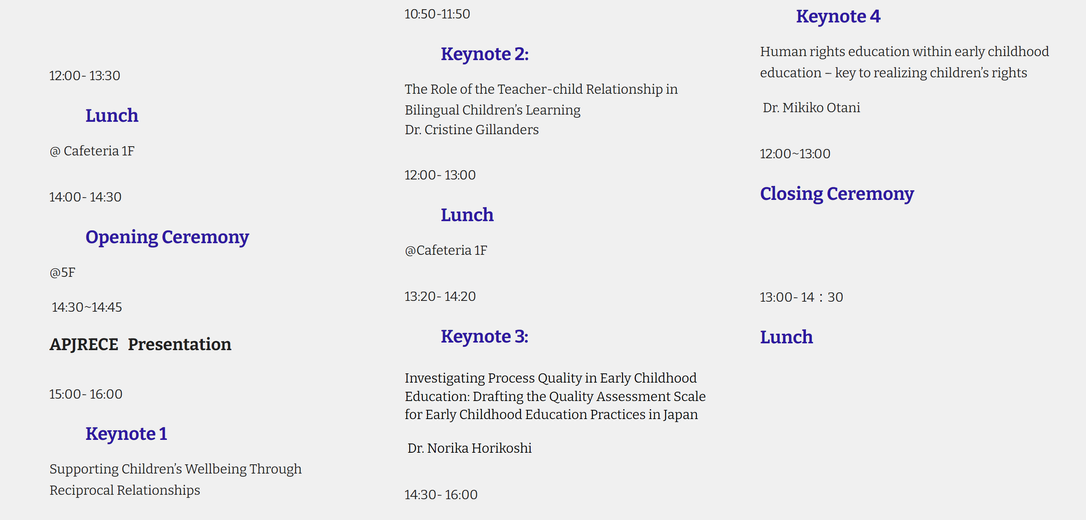
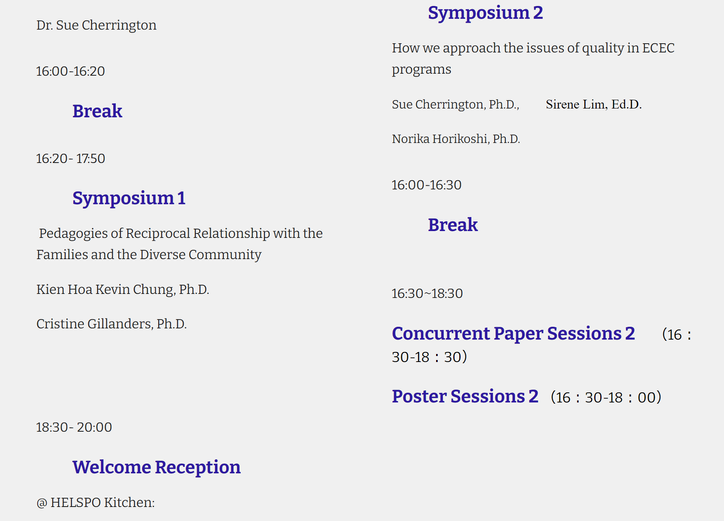




School Visit
Information
The maximum number of participants is 100.
The cost is 4700.
Only for the people who reigstered on the confrence site.
Regiatration is closed on June 10th.
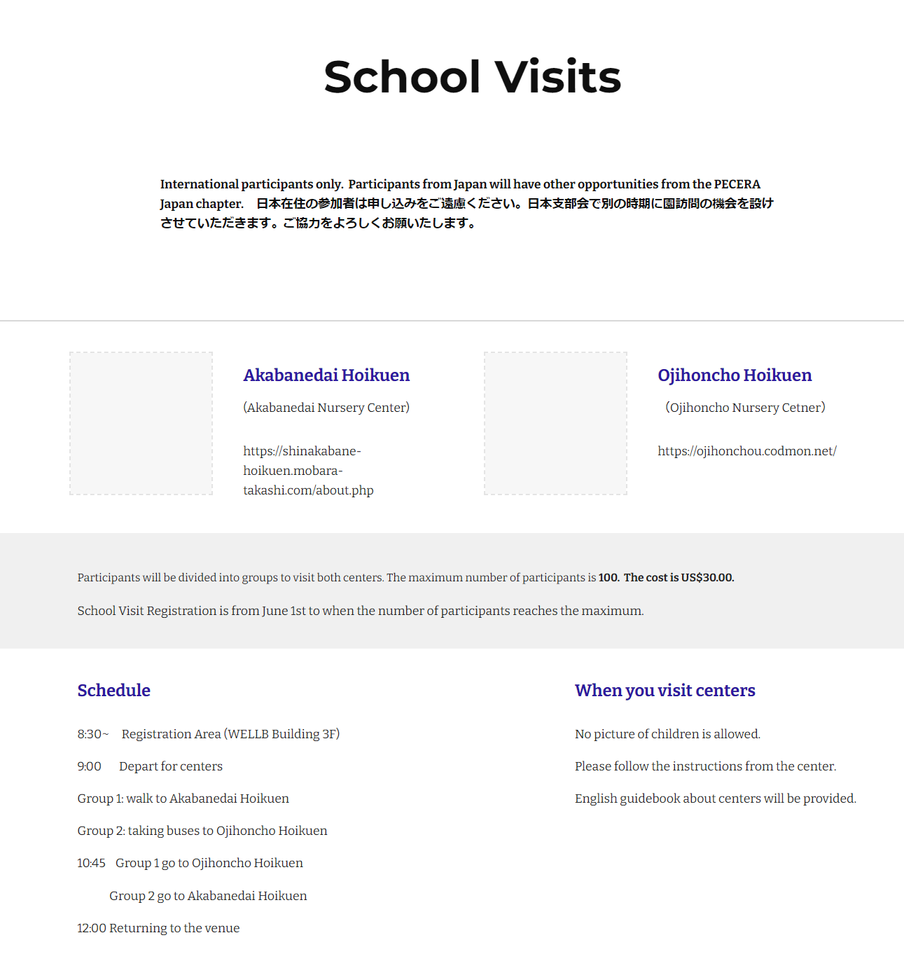

See you at
the conference!
Mailing Address
Toyo University, Department of Child Studies
WELLB HUB-2, 1-7-11, Akabane, Kita-ku
Tokyo 115-8650, Japan
Email Address
pecera2024Tokyo@outlook.jp
pecera2024tokyo@gmail.com